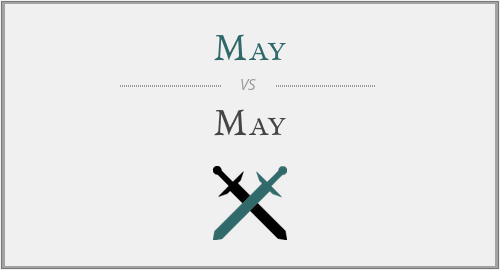May vs. May
Just before we get started, it's important to clarify that there’s no rule that the word ”may” must never be written with capital letters. In other words, writing ”may” with a capital letter does not automatically alter its meaning – at least not if it’s at the beginning of a sentence, as this case undoubtedly requires a capital letter.
Here, we’re talking about the actual clue that the first letter of the word gives us if written in the middle of a sentence. Anyway, let’s not confuse you further without concretely discussing and explaining each word on its own. Find a detailed explanation for how to use ”May” and ”may” correctly below.
When do we use “May”?
Written like this, with a capital letter, “May” can only ever mean one thing. The reason it’s written with a capital letter in every circumstance, no matter what its position is within a phrase, is that it’s a proper noun - it is the name of a month. “May” is what we call the fifth month of the Gregorian calendar year, the month that comes after April and before June.
Example: We’re celebrating her birthday in May. – “May” is the name of the fifth month of the year, hence it will always appear written with a capital letter.
When do we use “may”?
Alternatively, when written like this in the middle of a sentence, “may” is actually a common English modal verb, and it is used when referring to something that could possibly happen or is possibly true. Formally, the same word can be used when giving or asking for permission. And last but not least, “may” can also be used when talking about something that, in comparison to something else, is less important.
However, it’s not at all compulsory for “may” to appear written like this for it to carry this meaning. On the contrary, if it is placed at the beginning of a sentence, it is – of course – written with a capital letter as well. In this case, the only way to tell that it’s not referring to the fifth month of the year (which will also be written “May”) is by reading the context in which it’s being used: may acts as a verb and not as the name of a month.

Example 1: It may rain today because it’s very cloudy. – “may” is a modal verb used to talk about something that could possibly happen.
Example 2: Please, may I use your laptop today? – the verb “may” can also be used when asking for permission.
Example 3: It may be high-quality, but it’s way too expensive for us. – “may” can also be used when talking about something that is less important, when compared to something else.
Conclusion
Although they are spelled and pronounced exactly the same, “May” and “may” carry different meanings and belong to different word orders depending on the context in which they are used. Words such as these are called a ‘homonym’, as the two have identical spellings and pronunciations, but their definitions differ. Keep this in mind to identify whether it’s the name of the month or the modal verb - it’s all about context!




Have a discussion about this article with the community:
Report Comment
We're doing our best to make sure our content is useful, accurate and safe.
If by any chance you spot an inappropriate comment while navigating through our website please use this form to let us know, and we'll take care of it shortly.
Attachment
You need to be logged in to favorite.
Log In